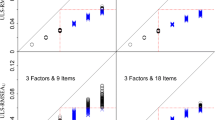Abstract
All too often inadequate experimental designs and/or faulty statistical analyses preclude generalization of findings. The authors of this paper discuss the need, in designing studies having educational variables, to give more attention to recognizing the universe of generalization and to incorporating into the design a variable that represents this universe. They further recommend that data analytic techniques, in turn, treat the levels of this variable as randomly selected from the universe.
Similar content being viewed by others
References
Bracht, G. H., & Glass, G. V. The external validity of comparative experiments in educational and the social sciences.American Educational Research Journal, 1968,5, 437–474.
Clark, H. H. The language-as-a-fixed-effect fallacy: A critique of language statistics in psychological research.Journal of Verbal Learning and Verbal Behavior, 1973,12, 335–359.
Coleman, E. B. Generalizing to a language population.Psychological Reports, 1964,14, 219–226.
Dwyer, F. M. The effect of IQ level on the instructional effectiveness of black-and-white and color illustrations.AV Communication Review, 1976,24, 49–61.
Frederiksen, N. Toward a taxonomy of situations.American Psychologist, 1972,27, 114–123.
Hughes, D. C., & Reid, N. A. Programmed learning and conventional teaching.Educational Research, 1975,18, 54–61.
Sells, S. B. (Ed.).Stimulus determinants of behavior. New York: Ronald Press, 1963.
Snow, R. E. Representative and quasirepresentative designs for research on teaching.Review of Educational Research, 1974,44, 265–291.
Winer, B.J. Statistical principles in experimental design. McGraw-Hill: New York, 1971.
Author information
Authors and Affiliations
Rights and permissions
About this article
Cite this article
King, D.W., King, L.A. Stimulus as a random factor in analysis of variance: Increasing the generalizability of findings. ECTJ 27, 179–184 (1979). https://doi.org/10.1007/BF02765449
Issue Date:
DOI: https://doi.org/10.1007/BF02765449




